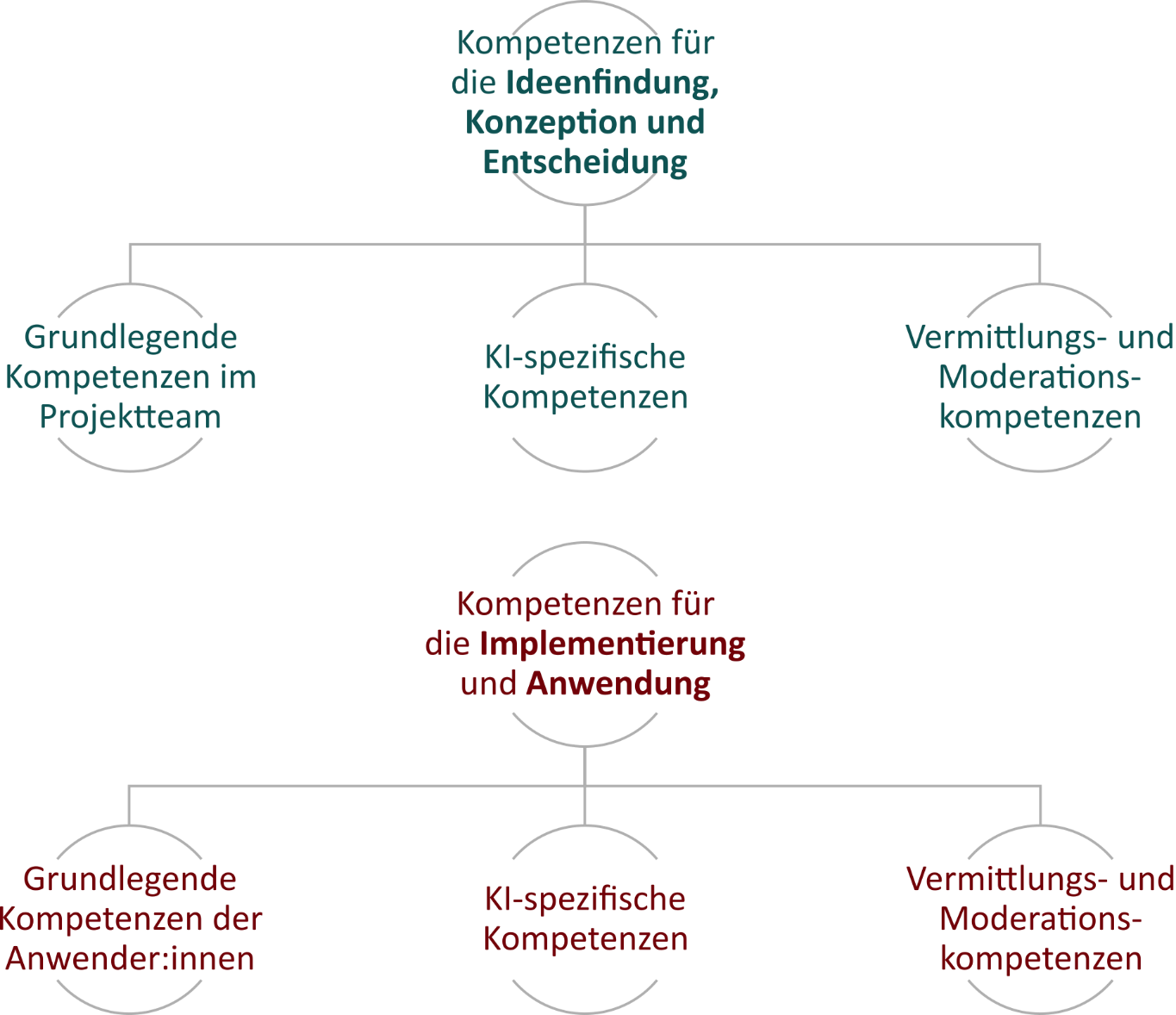
Dr. Djerdj Horvat
Fraunhofer Institute for Systems and Innovation Research ISI
Djerdj.Horvat@isi.fraunhofer.de

Marco Baumgartner
Karlsruhe University of Applied Sciences
marco.baumgartner@h-ka.de


Skills for and through AI
Relevance
AI is currently one of the most influential technologies and holds great potential for companies. Nevertheless, companies are still very reluctant to introduce AI technologies. One of the main obstacles to the introduction of AI is the lack of digital skills in companies. Project and management managers are increasingly facing challenges such as deciding on the introduction of AI, managing employees accordingly and moderating change. In addition, employees at operational level will need to be able to deal with AI technologies on a daily basis in the future and IT employees will be faced with new tasks in connection with AI development and maintenance. If these people involved in the AI project are not able to meet the challenges mentioned, AI projects in companies are at risk of failing. However, it is often difficult for companies to see what skills are required for this because they often have little previous experience with AI projects.
Objective
KARL aims to identify AI-related skills requirements in companies. With the help of the knowledge gained, an analysis grid is to be developed in KARL that enables companies to easily identify skills bottlenecks and address them through appropriate (further) training courses (skills for AI). As the skills required during the AI introduction process vary greatly, KARL aims to differentiate between the two phases of "idea generation, conception and decision" and "implementation and application" in the surveys and the design of the analysis grid. In addition to AI-specific skills, a strong focus is to be placed on mediation and moderation skills as well as basic skills in the project team and among users.
Specifically, KARL would like to explore the following questions:
- What skills do companies need to successfully introduce AI technologies and use them appropriately in the working environment?
- How are companies currently staffed in terms of skills for the introduction and use of AI technologies?
Based on the knowledge gained from this, KARL aims to support learning about AI by developing, testing and evaluating practical teaching and learning methods for skills development within companies and universities.
Furthermore, the application of intelligent knowledge-based systems should also offer a significant opportunity for innovation in the education sector. This lies in particular in the possibility of providing AI-supported, individualized content that is adapted to the learner (skills through AI). KARL would also like to investigate the potential as well as possible challenges and barriers of such AI-based qualification in terms of learning through AI.
Handouts for companies
- Analysis grid for identifying AI skills bottlenecks
- Workshop on AI skills
- Concepts for practical teaching and learning methods
Skills for and through AI
Relevance
AI is currently one of the most influential technologies and holds great potential for companies. Nevertheless, companies are still very reluctant to introduce AI technologies. One of the main obstacles to the introduction of AI is the lack of digital skills in companies. Project and management managers are increasingly facing challenges such as deciding on the introduction of AI, managing employees accordingly and moderating change. In addition, employees at operational level will need to be able to deal with AI technologies on a daily basis in the future and IT employees will be faced with new tasks in connection with AI development and maintenance. If these people involved in the AI project are not able to meet the challenges mentioned, AI projects in companies are at risk of failing. However, it is often difficult for companies to see what skills are required for this because they often have little previous experience with AI projects.
Objective
KARL aims to identify AI-related skills requirements in companies. With the help of the knowledge gained, an analysis grid is to be developed in KARL that enables companies to easily identify skills bottlenecks and address them through appropriate (further) training courses (skills for AI). As the skills required during the AI introduction process vary greatly, KARL aims to differentiate between the two phases of "idea generation, conception and decision" and "implementation and application" in the surveys and the design of the analysis grid. In addition to AI-specific skills, a strong focus is to be placed on mediation and moderation skills as well as basic skills in the project team and among users.
Specifically, KARL would like to explore the following questions:
- What skills do companies need to successfully introduce AI technologies and use them appropriately in the working environment?
- How are companies currently staffed in terms of skills for the introduction and use of AI technologies?
Based on the knowledge gained from this, KARL aims to support learning about AI by developing, testing and evaluating practical teaching and learning methods for skills development within companies and universities.
Furthermore, the application of intelligent knowledge-based systems should also offer a significant opportunity for innovation in the education sector. This lies in particular in the possibility of providing AI-supported, individualized content that is adapted to the learner (skills through AI). KARL would also like to investigate the potential as well as possible challenges and barriers of such AI-based qualification in terms of learning through AI.
Handouts for companies
- Analysis grid for identifying AI skills bottlenecks
- Workshop on AI skills
- Concepts for practical teaching and learning methods

Dr. Djerdj Horvat
Fraunhofer Institute for Systems and Innovation Research ISI
Djerdj.Horvat@isi.fraunhofer.de

Marco Baumgartner
Karlsruhe University of Applied Sciences
marco.baumgartner@h-ka.de



